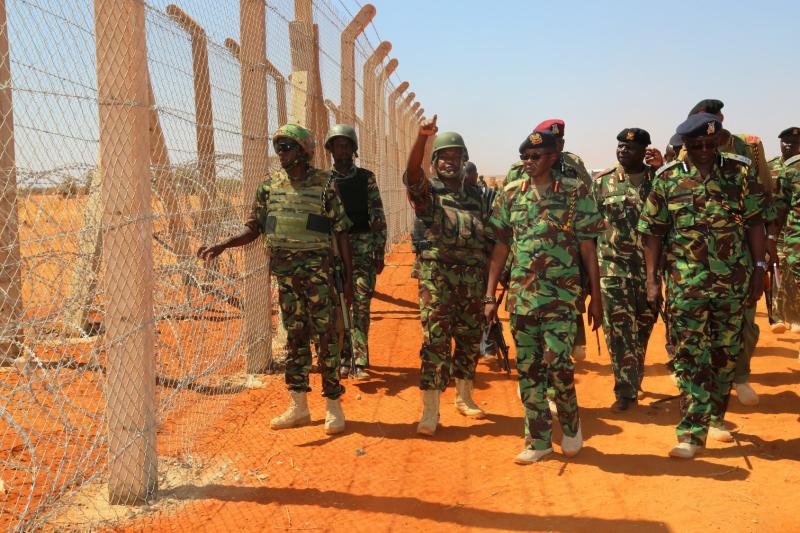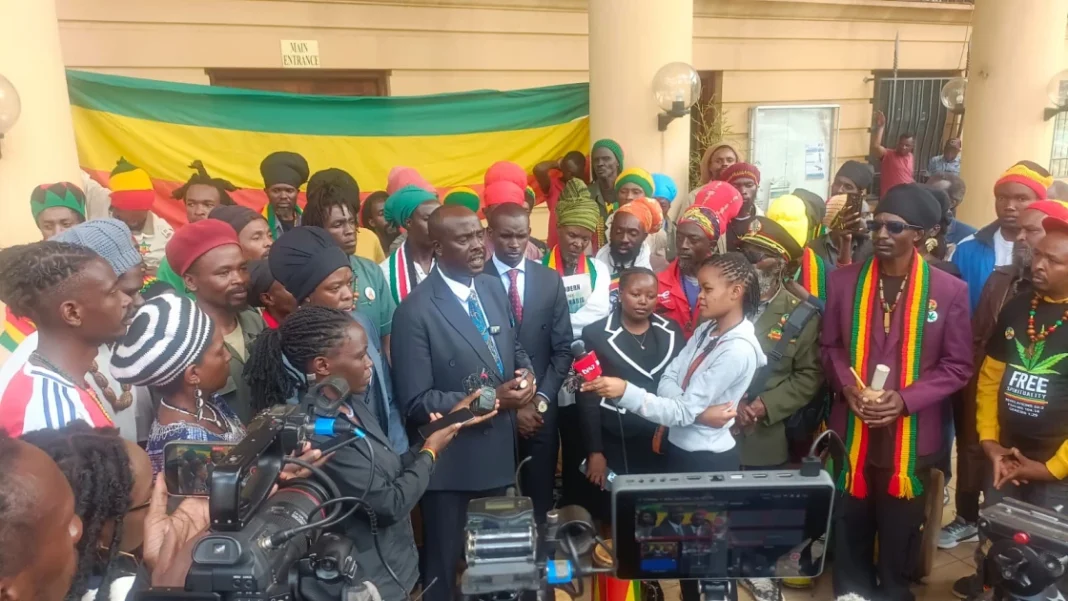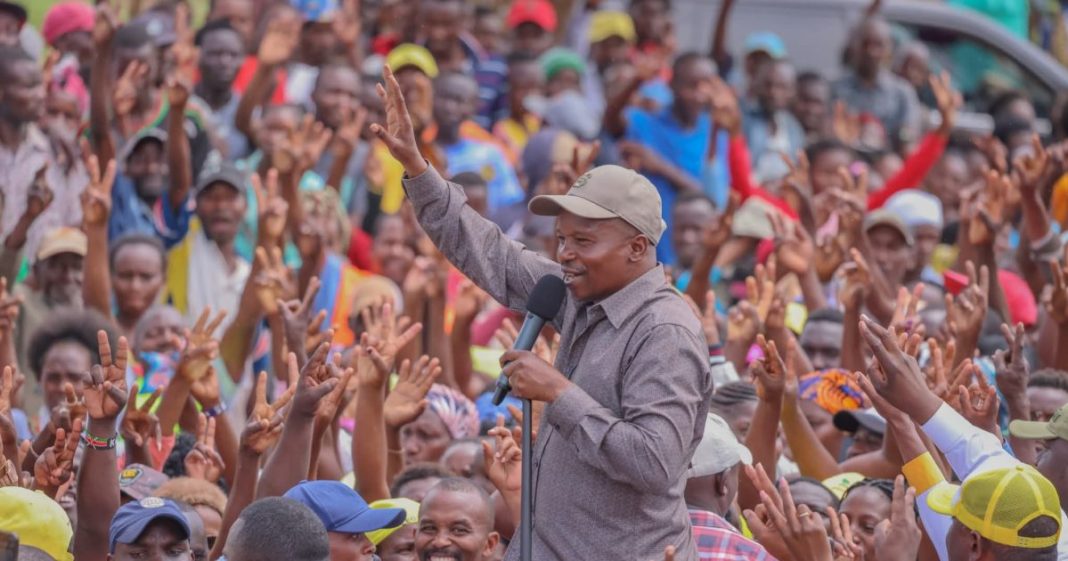Leaders from North Eastern Kenya have renewed calls for the immediate reopening of the Kenya–Somalia border, warning that the prolonged closure is stifling local economies and deepening frustration among communities that rely heavily on cross-border trade.
Speaking at a meeting in Garissa on Tuesday, Fafi MP Salah Yakub urged President William Ruto to intervene, saying the region’s economic fortunes are tied to access through the frontier.
“We are the second-largest economy, yet nobody comes back to assist us. A town like Garissa depends on that border, which is just 40 kilometres away and 50 kilometres to Kismayu port. We are asking the President to direct its reopening so that we can freely trade,” Yakub said.
The Kenya–Somalia border was officially closed in October 2011 as part of efforts to curb Al-Shabaab attacks. What was meant to be a temporary security measure has instead resulted in years of restricted movement and disrupted business, affecting towns such as Garissa, Mandera, and other communities along the frontier.
In May last year, Kenya and Somalia agreed on a phased reopening of three key border points starting with Mandera, followed by Garissa and Lamu. But the plan stalled after a surge in deadly attacks in June of the same year.
On June 13, eight police officers were killed in Garissa when their vehicle hit an improvised explosive device. Less than two weeks later, five civilians were killed in Lamu in an attack linked to Al-Shabaab, with some victims found beheaded. The renewed insecurity forced authorities to slow the reopening process, leaving border communities in limbo once again.
Despite much of the trade happening informally, Kenya exported goods worth about USD130 million (roughly Ksh16.8 billion) to Somalia in 2024, while imports stood at just over USD4 million (about Ksh517 million), underscoring the importance of the cross-border market.
Meanwhile, leaders have raised fresh concerns over delays in issuing national ID cards to residents despite President Ruto signing an Executive Order earlier this year waiving the vetting requirement for Northeastern applicants.
Tarbaj MP Ibrahim Saney said many processed ID forms remain stuck in Nairobi, accusing unnamed officials of sabotaging the President’s directive meant to ease access to identification documents.
“They call it validation in Nairobi, yet no IDs are being issued in Garissa. Vetting has been removed, but the IDs are not coming back,” Saney said. “Who is this sabotaging the President? Something must be done about the production of identification cards.”
The leaders now want both the border reopening plan and the ID issuance directive implemented without further delay, saying the region cannot afford continued administrative and economic setbacks.







Hello, I desire to subscribe for this webpage to get hottest updates, therefore where can i do it please assist.
I just couldn’t leave your website prior to suggesting that I really loved the standard information a person supply on your guests? Is going to be again steadily to check up on new posts
Pretty nice post. I just stumbled upon your weblog and wished to mention that I have really loved browsing your weblog posts. After all I’ll be subscribing on your feed and I’m hoping you write again soon!
I would like to thank you for the efforts you have put in writing this website. I really hope to check out the same high-grade content from you later on as well. In truth, your creative writing abilities has encouraged me to get my very own website now 😉
Pretty! This has been an extremely wonderful article. Thanks for supplying this information.
Wow, wonderful blog layout! How long have you been blogging for? you made blogging look easy. The overall look of your site is magnificent, as well as the content!
An intriguing discussion is definitely worth comment. I do think that you ought to publish more on this topic, it might not be a taboo matter but usually folks don’t discuss such subjects. To the next! Kind regards!!
Thanks for the marvelous posting! I genuinely enjoyed reading it, you are a great author. I will be sure to bookmark your blog and will eventually come back someday. I want to encourage you to definitely continue your great writing, have a nice day!
I think this is among the most significant information for me. And i’m glad reading your article. But wanna remark on some general things, The web site style is ideal, the articles is really excellent : D. Good job, cheers
It’s wonderful that you are getting thoughts from this piece of writing as well as from our argument made here.
Wow that was unusual. I just wrote an really long comment but after I clicked submit my comment didn’t show up. Grrrr… well I’m not writing all that over again. Anyway, just wanted to say superb blog!
[1221]JL3 Online Casino Philippines: Official Login, Register, Slot Games & App Download Experience the ultimate gaming at JL3 Online Casino Philippines! Access your jl3 login, complete a quick jl3 register, and play top jl3 slot games. Secure your jl3 app download now for big wins! visit: jl3
Thanks for any other wonderful article. Where else may just anybody get that type of info in such an ideal method of writing? I have a presentation next week, and I’m on the search for such info.
online casino for us players paypal
References:
http://www.naukriupdate.pk
paypal casinos online that accept
References:
jobsbotswana.info
Cucumber ribbon, cherry tomato, feta cheese, pickled red onion, mesclun lettuce, ranch dressing Our facilities are world-class, as is our catering and breathtaking beachfront location…no wonder our venues are popular with
function and event organisers worldwide. Mindil Beach Casino Resort is the
premium business and events destination in the Top End and features Darwin’s only five-star resort and four-star hotel.
Relax and enjoy appetizers that are perfect for sharing, award-winning cocktails (or maybe
a top-shelf whisky), and listen to live tunes from NT’s most talented musicians.
Sandbar is the place to be for after-work drinks or simple, relaxed
dining with friends.
Whether you enjoy table games or gaming machines,
earning Lucky North® Club Tier Status is simple. Reach a new Tier threshold, and enjoy your
Tier Benefits. Take advantage of our amazing facilities and beachfront
location with Hotel rooms from $299 or Resort rooms from $399!
References:
https://blackcoin.co/amazing-facts-about-online-casino-poker-games-you-should-know/
Nowhere else can you share the experience of Darwin’s best Italian food, Italian wine, good times,
and great views! The Superior Lagoon rooms offer a private sanctuary amid
a tropical paradise. These rooms offer a
private balcony with an outdoor setting with sweeping picturesque views
of the lagoon. Nestled amongst the resort, located on the first floor, the Lagoon Rooms offer a deluxe king bed or 2
queen beds, separate luxury bathroom, state of the art flat
screen TV and mini bar. Relax on the expansive balcony with day bed, sun lounges, outdoor shower and
direct access to the glistening lagoon pool. The Mindil Suite features generous living area with six-seater dining table,
butler’s pantry with kitchenette, powder room, dressing room
and oversized double bathroom with a free-standing
bath, television and separate shower.
300gm grilled and sliced striploin, fondant potato, grilled king mushrooms,
asparagus, grape sauce Selection of bruschetta bread with
tomato, prosciutto, anchovies, grilled vegetables Bacon, fried
egg, tomato, cheddar cheese, iceberg lettuce, white toast, mayo, chips Ham,
pineapple, three cheese, tomato sauce Creamy garlic sauce, spring onion,
semi-dried tomato
References:
https://blackcoin.co/fast-payout-casinos-the-ultimate-guide-2025/
An diesem aufregenden Automatenspiel suchst du ägyptische Pyramidenschätze.
Das Gameplay dieses Slots ist außergewöhnlich – und die
Chance, in Faust online große Gewinne zu erzielen, ist da mehr
als nur ein zusätzlicher Bonus! Üben kannst du beispielsweise in einem
Spiel, das kostenlos zur Verfügung steht. Wenn du beispielsweise viel über Blackjack Wahrscheinlichkeiten oder
Roulette Systeme weißt, findest du eher die richtige Herangehensweise für die richtige Situation.
Zu den Highroller Games gehören unter anderem die Spiele Book of Ra Deluxe,
Highroller Sizzling Hot Deluxe und Lucky Lady´s Charm Deluxe.
Auch Jackpot Spiele und Highroller Games können gespielt werden. Slots gibt es bei Gametwist in so großer Vielfalt,
wie man es sich kaum vorstellen kann. Aufgrund der großen Auswahl an Spielen wird
es in dem Gametwist Casino niemanden langweilig. Im Gametwist Casino wird eine große Auswahl an Casino Spielen angeboten, die Vielfalt pur
mit sich bringen und für die verschiedensten Spielertypen gedacht
sind. Erfahrungsgemäß werden die Gratis-Twists jedoch irgendwann einmal knapp.
References:
https://online-spielhallen.de/amunra-casino-login-ihr-portal-zu-spielen-und-gewinnen/
I’ve gained a much better understanding thanks to this post.
Mehdi Aysenur Musaogullari 1401 E 55th St Apt 714n, Chicago, IL, 60615
ahmet enes musaogullari fetoden kacti +1 (614) 736-5168
Mehdi Serife Musaogullari +1 (937) 658-3805 musaogullariserife@gmail.com
I’ve bookmarked this post for future reference. Thanks again!
I like how you kept it informative without being too technical.
I wasn’t expecting to learn so much from this post!
I love how clearly you explained everything. Thanks for this.
Very useful tips! I’m excited to implement them soon.
So simple, yet so impactful. Well written!
Thank you for sharing this! I really enjoyed reading your perspective.
What a great resource. I’ll be referring back to this often.
The way you write feels personal and authentic.
Great post! I’m going to share this with a friend.
I love how well-organized and detailed this post is.
What a helpful and well-structured post. Thanks a lot!
What a helpful and well-structured post. Thanks a lot!
I love the clarity in your writing.
This post gave me a new perspective I hadn’t considered.
I wish I had read this sooner!
Such a refreshing take on a common topic.
Thanks for making this easy to understand even without a background in it.
This was so insightful. I took notes while reading!
I love how well-organized and detailed this post is.
I appreciate the depth and clarity of this post.